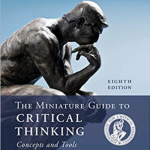Do you find it easy to find data or evidence to support a belief, a statement, or a particular truth? When you find data and evidence, how do you know if what you have found is true, reliable and trustworthy?
In the years when I was growing up, searching out data and evidence was both easier and harder. Without smart phones and thousands of apps, we often relied on 26-volume encyclopedias, one book for each letter of the alphabet. I still remember sitting on the floor of my living room, surrounded by the letter books of the encyclopedia, as I wandered from the R volume for Rome to the M volume for Mediterranean to the C volume for Caesar! Then of course, all had to be put away as well!
Back then, I — along with my friends and usually encouraged by parents and teachers — assumed that since the evidence or information was in a printed book as impressive as the Brittanica Encyclopedia that it was reliable and truthful. We did not do much questioning.
Now we are literally avalanched with data and evidence. Which of these data sources are reliable, truthful or curated (truly fact-checked and researched)? Now is the time for serious questioning. There are lots of guides on critical thinking and serious questioning, but if you have time for just 2 or 3 questions, start with these:
- Does this make sense?
- Who is the author?
- What purpose does the author have?
Another great add-on question is: What assumptions are the author making?
Enjoy your search for truth!

